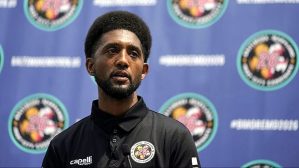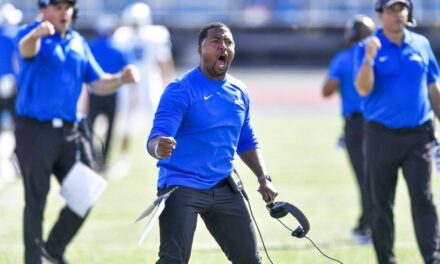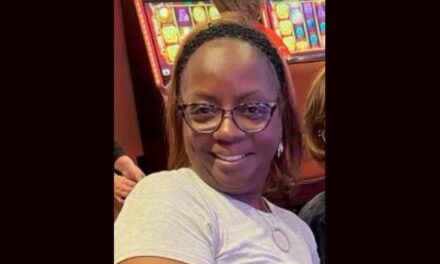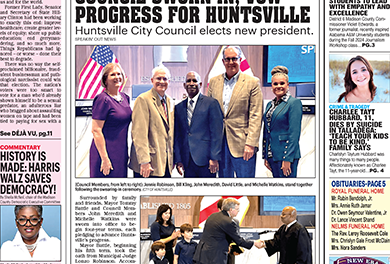By Deborah Bailey,
Special to the AFRO
Sworn into office in a small, socially-distanced ceremony in December 2020, the twin-pandemics brought on by Covid-19 and escalating violence stared Brandon Scott fully in the face on day one. Scott had no time for a classic “honeymoon period” generally afforded a newly minted mayor.
Instead, Scott was on the front line in a twin-pandemic of his own, bringing Baltimore’s outdated city systems and services into the 21st century while managing the city’s response to Covid-19 pandemic in tandem with multiple crisis issues with a cool, collected persona.
“I’ve always been even keeled, because I know my city. I know what I signed up for and I know what the residents need from me and that’s strong, focused leadership,” Scott said.
Scott quickly recognized city government infrastructure needed to be revamped for the city to work effectively for Baltimoreans. Baltimore city government is an old house, in need of immediate updates – some visible to the naked eye, some not…but all critical to transforming Baltimore into the 21st urban hub of Maryland.
“Our city was really broken down and rotten at the core.” Scott said just a year ago, even basic city government functions were long outdated and grossly inefficient.
“The most difficult part of the job is the need to rebuild city government from the ground up juxtaposed with the real, immediate issues,” Scott said. “Both of these issues are connected,” Scott said.
“If we don’t have a strong foundation, we can’t reduce violence, reduce vacant homes, build better schools and recreation centers” Scott said. “Both of these issues are connected,” Scott added.
Even basic city functions had not yet been computerized in early 2021.
“When I took office, even doing basic things were antiquated– timesheets were done by hand. Our trash trucks and recycling vehicles were still using paper maps and not GPS,” he said.
“When we’re dealing with a city government that was that outdated and broken, we have to build it from the ground-up. We can’t operate in 2022 with a city government based on 1980’s and 90’s equipment and technology,” he reiterated.
Scott added there was no centralized listing of city-owned property when he first came into office. He has updated many of the city’s basic obsolete systems, processes and technologies. He wants residents to know the extent of restructuring needed to update city services.
“This is about building that foundation for us to be the best city government. That’s really what my first year was about, Scott said. Digging in deep on things that should have been done many years ago but they weren’t,” he added.
“I’m not in the business of blaming people. It’s my job to do it now,” Scott said.
Scott also wanted to reminded Afro readers that the city’s deep systemic problems take time to be fully treated.
“The issues in Baltimore are older than me. Violence has been plaguing Baltimore longer than I’ve been alive. Vacant properties, the same,” Scott said listing a plethora of longstanding concerns he is working to address.
“These issues have existed for so long. I’m working on these issues with every breath in my body,” Scott said. “This was never going to be a situation where I sit down, flip the switch and everything changes,” he added.
Scott knows he is rebuilding city government while simultaneously steering Baltimoreans safely though an unpredictable, continuing global pandemic.
“I was sworn in on December 8 and December 9th I shut the city down,” Scott said regarding Covid-19 guidance in the early days of his administration.
Scott credits Baltimore Health Commissioner Letitia Dzirasa and guidance from Baltimore’s two medical institutions, Johns Hopkins and University of Maryland.
“It’s really about just following the health advice. It’s simple. We have the best health commissioner in the country. And I have an advantage no other mayor has. The CDC gets their advice from Johns Hopkins and I have the University of Maryland Medical Center right here in Baltimore.”
“I’m able to make public health informed judgements long before other places because I have the world’s experts here,” Scott said.
Scott feels most Baltimoreans now trust his judgement on making decisions about their welfare as the Covid-19 pandemic moves toward year three.
Scott said the tough calls he needed to make to close establishments in the early days of the pandemic were based on a simple anecdote. With his even-keeled personality, Scott was never worried about residents becoming upset by an unpopular decision made to keep them safe.
“This is about doing the right thing and not the popular one. But there’s something you have to be in order to be mad…and that’s alive,” Scott said.
“If you are alive – then you can be mad,” said Scott.
This is the first of a series of periodical articles this year giving Afro readers a peek into the joys and challenges of serving as Baltimore’s Mayor from the perspective of Park Heights’ native son, Brandon Scott. Next week’s article will focus on Mayor Scott’s first year in handling violent crime in Baltimore.
Help us Continue to tell OUR Story and join the AFRO family as a member – subscribers are now members! Join here!
The post Mayor Brandon Scott: A year later appeared first on AFRO American Newspapers .











